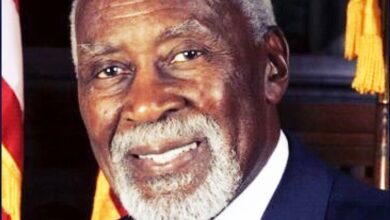
Edward Henderson | California Black Media
“Senate Bill (SB) 437 utilizes the California State University to explore options to determine how to confirm if an individual is a descendant of a person who was a victim of American chattel slavery,” said Sen. Akilah Weber Pierson (D-San Diego).
“The bill seeks to determine a clear, concise and evidence-based process for individuals to verify genealogical ties and claims to potential benefits or rights associated with their ancestral heritage” continued Weber Pierson, who is also Chair of the California Legislative Black Caucus (CLBC).
Weber Pierson was speaking during a Senate Judiciary Committee hearing for her bill, SB 437, which was held on April 22.
This article is the third in a series by California Black Media (CBM) providing details on the 16 bills in the Black Caucus’s 2025 “Road to Repair” package, including SB 437.
Each article focuses on four pieces of legislation. Here are summaries of this week’s four bills with information about their authors, and updates on where each one is in the legislative process.
SB 437
SB 437, introduced by Weber Pierson, would require the California State University to study and report on scientific methods for verifying whether someone is a descendant of an enslaved person in the U.S.
In 2020, California enacted AB 3121, establishing the Reparations Task Force to study and develop proposals for addressing the lasting impacts of slavery and systemic discrimination against African Americans. The task force emphasized the need for improved documentation and recognition of genealogical and descendancy claims to ensure access to reparative programs.
“SB 437 builds on these findings by requiring the CSU to develop an accurate and evidence-based eligibility standard for reparative claims,” said Weber Pierson. “By developing such standards, it aids AB 7 by providing a clear and concise process for determining who is a descendant of American chattel slavery.”

On April 22, the Senate Judiciary Committee voted 11-2 to advance the bill. It now heads to the Senate Appropriations Committee for review.
SB 503
SB 503, also introduced by Weber Pierson, seeks to regulate the use of artificial intelligence in critical healthcare applications to mitigate racial biases present in commercial algorithms or common in Large Language Model (LLM) data sets.
“As A.I. becomes more prevalent in healthcare, we must be vigilant about how biases in these technologies can perpetuate existing racial disparities,” said Weber Pierson. “If A.I. models are trained on biased data, it can lead to misdiagnoses of Black patients or provide inadequate treatment recommendations, which could ultimately deepen health inequalities.”
Weber Pierson believes that addressing A.I. bias is vital for creating a healthcare system that serves everyone equally, ensuring that Black patients and other minority groups are not left behind or harmed by technological advancements.
AB 935
AB 935, introduced by Assemblymember Rhodesia Ransom (D-Stockton), would require the Civil Rights Department and the Department of Education to collect anonymized data including gender and marital status to determine how complaints are handled.
“This bill brings transparency, exposes patterns of injustice, and empowers California to take meaningful action,” said Ransom. “For too long, systemic disparities have gone unaddressed and unchallenged. Without data, we cannot measure the full scope of discrimination or craft effective policies to combat it.”
Existing law prohibits the inclusion of any question relative to an applicant’s race in any application form required to be filled in and submitted by an applicant to any department, board, commission, officer, agent, or employee of this state. Existing law also states that any person who violates this provision is guilty of a misdemeanor.
The Assembly Education Committee is currently reviewing AB 935 after the Judiciary Committee voted 9-1 on April 8 to move it forward.
AB 785
AB 785, introduced by Assemblymember LaShae Sharp-Collins (D-La Mesa) would create the Community Violence Interdiction Grant Program, which would fund community-driven solutions to decrease violence in neighborhoods and schools.
“For too long we have been told that there is not enough money to fund programs that invest in youth and end the pipeline into incarceration,” said Sharp-Collins. “AB 785 rejects that and would allocate savings from prison closures to evidence-based programs like diversion and school-based health to reduce community violence.”
Applicants for grant funding must show how they will focus on students most affected by trauma, especially those who struggle to access traditional services, such as low-income or homeless students, those with PTSD or severe trauma, immigrant and refugee students, students with special needs, and those involved with child protective services or the juvenile justice system.
On April 23, the Assembly Committee on Health voted 13-0 in favor of AB 785. It is currently under review by the Senate Appropriations Committee.




